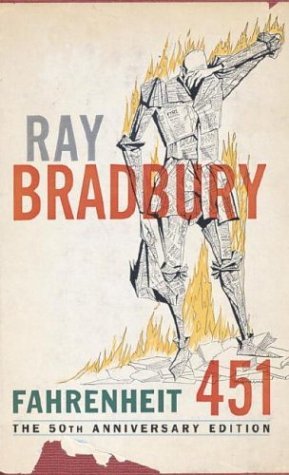Here's a silly story, from an exercise we had called "The Sky's the Limit." You and a partner write one sentence, something that's really out of the ordinary. Take for example, the first line of Franz Kafka's
Metamorphosis where a man wakes up as an insect. Then you and the partner trade the sentence and write a story about it. This is what I came up with. Comments, criticisms, outright bashing are all right! Stealing is not.
IN CIRCLES
She stared at it for a long time, trying to clear the glare in her eyes. She waited for it to take her on as it has so many nights before. The small, circular, white device on the wall of her apartment hallway had one single red light that blinked constantly. It wasn’t the light that bothered her so much, but rather the drawn-out, high-pitched beeping that it emitted any given moment during the day. The nights were always the worst. The beeps drifted from the circular device and seeped into all the crevices and every inch of space of the apartment. It beeped when she watched television, when she was contorted into mangled yoga positions, and when she had dinner dates. It blared loudest in her bedroom, tapping against her ear drums like a drill.
She was hoping for a quiet evening, an occasional and rare treat that she savored. She protected her ears with swimmers’ ear plugs; the kind that molded to the unique contour of her ear. She slid into bed wearing red and green flannel pajamas and opened a crisp copy of Franz Kafka’s
Metamorphosis and Other Stories. After reading the first five sentences, she grew bored and opted for the latest Self magazine. She came across a quiz, “Are You Mentally, Physically, and Spiritually Stable?” and grabbed a pencil, lured in by the prospect of psychoanalysis.
In the midst of her excitement, the beeping started again. It drifted into her room, and crawled into bed with her, under the covers, and traveled to the opening of her ears. There, it burrowed its way through the tightly compacted gel of the ear plugs and resumed its jackhammer-like drills. Her eyes widened in fright, and she clenched her comforter in tightly in a heated frenzy. She threw the covers off of her and bolted from the bed. She went to her closet and grabbed a sneaker. She opened her bedroom door, and saw the circular device, beeping and blinking maniacally. She flexed her bicep muscles and held the shoe with tight tension.
“Shut the fuck up!” she yelled hysterically, as she beat it furiously with the sneaker. It was knocked from the wall and smashed into fragments, electronic pieces that shone like glitter on the bland, beige carpet of her hallway.
It continued to beep. The intensity of the beeping increased, as it was no longer covered by the white circular shield. She screamed at a volume that rivaled the beeping but the humanly yelps were no opponent to the unworldly noises coming from the broken circular device. She went back to her bedroom, searching for a shirt, a blanket, something to muffle the decimated mess on the floor of her hallway. She found an old wool blanket and dropped all the pieces, even the batteries, into it, and wrapped it in a tight bundle. She went to living room, then to her balcony, where the night air seized her, taking her aback from the sudden chilly blast. She looked down the five floors from her balcony to the street below. The city lights twinkled and the cars breezed by unbeknownst to the abject horror she felt in her bloodshot eyes, crinkled hair, and restless rage. She held the package over the side of the balcony, readying to drop the load.
“Goodnight…bitch!” she called out, her breath visible in a long steamy stream, as she released the bundle and allowed it to fall to the concrete.
She had the soundest sleep of her life. A week went by without the beeping circular device and she slept so deeply that she finally felt revitalized. The kinks in her hair ironed out. Her eyes, once sunken and black, were bright and alluring. After a 40-minute yoga session and a breakfast of granola and yogurt, she felt more limber and energized than ever.
There was a knock at the door after she finished washing her dishes. She muttered her recognition to the visitor, and took a moment to dry her hands on a kitchen towel. She approached the door and looked through the peephole to see the stranger. There appeared to be no one at the door.
“Who’s there?” she asked through the wood, perhaps in the off chance the visitor had stood away from the narrow vision of the peephole.
“It’s Tom,” the voice said. He was the apartment manager.
She opened the door cautiously and when she saw the outlines of his brown boots and khakis, she poked her head through the ajar door. He smiled and waved at her.
“Hi Nina,” he said. “I’m not sure why, but I found this on my balcony this morning and I was wondering if it was yours.”
He held out a gray, woolen blanket that wrapped in a tight bundle. Nina’s eyes widened, horrified.
“I opened it. It looks like a fire alarm,” he said, shuffling the balled up blanket from one hand to the next.
She took it from him and unraveled the folds. When it opened, she saw the decimated contents of the circular device—the fire alarm—and then beeping began again. She let it drop to the floor to cover her ears with her palms.
“Turn it off, turn it off! I can’t stand it!” she cried out, panicking. Tom bent down and rummaged through the parts. He found the piece attached to the batteries. It was brown and beginning to rust. He fiddled with a switch and the beeping stopped. Nina pulled her hands away from her ears and looked down at him, heaving out a quick breath of air.
“You know,” Tom said, his face growing with concern. “It’s illegal in this district to disconnect your fire alarm. And you broke yours...”
“You know, Tom. It’s illegal to disturb the peace and quiet of a tenant’s rented property.”
He huffed out a breath of air. “I’ll buy you dinner, and we’ll call it even?”
She smiled. “Sure! And oh, I’m gonna need a new fire alarm…”








